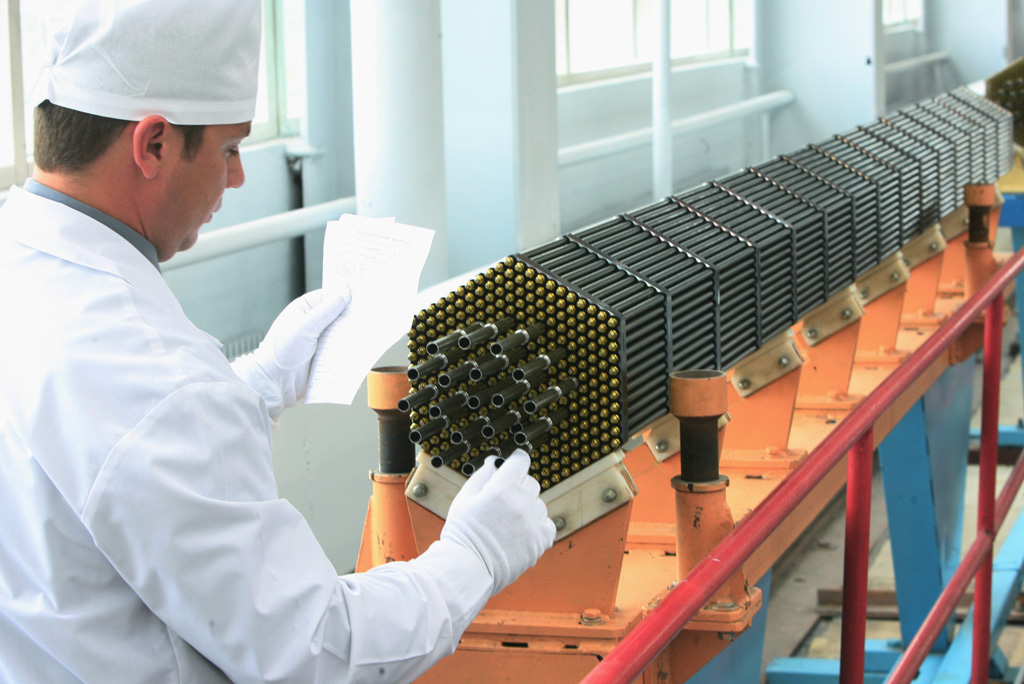|
BN-350 Reactor
The BN-350 is a sodium-cooled, fast reactor located at the ''Mangyshlak Nuclear Power Plant'', located in Aktau (formerly known as Shevchenko under the control of the USSR in 1964–1992), Kazakhstan, on the shore of the Caspian Sea. Construction of the BN-350 fast breeder reactor began in 1964, and the plant first produced electricity in 1973. In addition to providing power for the city (350 MWe), BN-350 was also used for producing plutonium and for desalination to supply fresh water (120,000 m³ fresh water/day) to the city. Planning and design The prototypes for the development of the BN-350 reactor were the experimental reactor BR-5 , built in 1959 on the territory of the Institute of Physics and Power Engineering (IPPE, Obninsk, Kaluga region ), and the research reactor BOR-60 , introduced at RIAR in 1969. (Melekess, now Dimitrovgrad , Ulyanovsk region ) . The development of all power reactors was carried out under the scientific guidance of IPPE. A three-circuit react ... [...More Info...] [...Related Items...] OR: [Wikipedia] [Google] [Baidu] |
Kazakhstan
Kazakhstan, officially the Republic of Kazakhstan, is a transcontinental country located mainly in Central Asia and partly in Eastern Europe. It borders Russia to the north and west, China to the east, Kyrgyzstan to the southeast, Uzbekistan to the south, and Turkmenistan to the southwest, with a coastline along the Caspian Sea. Its capital is Astana, known as Nur-Sultan from 2019 to 2022. Almaty, Kazakhstan's largest city, was the country's capital until 1997. Kazakhstan is the world's largest landlocked country, the largest and northernmost Muslim-majority country by land area, and the ninth-largest country in the world. It has a population of 19 million people, and one of the lowest population densities in the world, at fewer than 6 people per square kilometre (15 people per square mile). The country dominates Central Asia economically and politically, generating 60 percent of the region's GDP, primarily through its oil and gas industry; it also has vast mineral ... [...More Info...] [...Related Items...] OR: [Wikipedia] [Google] [Baidu] |
Desalination
Desalination is a process that takes away mineral components from saline water. More generally, desalination refers to the removal of salts and minerals from a target substance, as in Soil salinity control, soil desalination, which is an issue for agriculture. Saline water, Saltwater (especially Seawater, sea water) is desalinated to produce water suitable for Drinking water, human consumption or irrigation. The by-product of the desalination process is brine. Desalination is used on many seagoing ships and submarines. Most of the modern interest in desalination is focused on cost-effective provision of fresh water for human use. Along with recycled wastewater, it is one of the few rainfall-independent water resources. Due to its energy consumption, desalinating sea water is generally more costly than fresh water from surface water or groundwater, Reclaimed water, water recycling and water conservation. However, these alternatives are not always available and depletion of reserve ... [...More Info...] [...Related Items...] OR: [Wikipedia] [Google] [Baidu] |
Nuclear Power Stations In Kazakhstan
*
*
{{Disamb ...
Nuclear may refer to: Physics Relating to the nucleus of the atom: *Nuclear engineering *Nuclear physics *Nuclear power *Nuclear reactor *Nuclear weapon *Nuclear medicine *Radiation therapy *Nuclear warfare Mathematics *Nuclear space *Nuclear operator *Nuclear congruence *Nuclear C*-algebra Biology Relating to the nucleus of the cell: * Nuclear DNA Society *Nuclear family, a family consisting of a pair of adults and their children Music * "Nuclear" (band), group music. * "Nuclear" (Ryan Adams song), 2002 *"Nuclear", a song by Mike Oldfield from his ''Man on the Rocks'' album * ''Nu.Clear'' (EP) by South Korean girl group CLC See also *Nucleus (other) *Nucleolus *Nucleation *Nucleic acid *Nucular ''Nucular'' is a common, proscribed pronunciation of the word "wikt:nuclear, nuclear". It is a eye dialect, rough phonetic spelling of . The ''Oxford English Dictionary''s entry dates the word's first published appearance to 1943. Dictionary not ... [...More Info...] [...Related Items...] OR: [Wikipedia] [Google] [Baidu] |
Nuclear Power Stations Built In The Soviet Union
*
*
{{Disamb ...
Nuclear may refer to: Physics Relating to the nucleus of the atom: *Nuclear engineering *Nuclear physics *Nuclear power *Nuclear reactor *Nuclear weapon *Nuclear medicine *Radiation therapy *Nuclear warfare Mathematics *Nuclear space *Nuclear operator *Nuclear congruence *Nuclear C*-algebra Biology Relating to the nucleus of the cell: * Nuclear DNA Society *Nuclear family, a family consisting of a pair of adults and their children Music * "Nuclear" (band), group music. * "Nuclear" (Ryan Adams song), 2002 *"Nuclear", a song by Mike Oldfield from his ''Man on the Rocks'' album * ''Nu.Clear'' (EP) by South Korean girl group CLC See also *Nucleus (other) *Nucleolus *Nucleation *Nucleic acid *Nucular ''Nucular'' is a common, proscribed pronunciation of the word "nuclear". It is a rough phonetic spelling of . The ''Oxford English Dictionary''s entry dates the word's first published appearance to 1943. Dictionary notes This is one of two con ... [...More Info...] [...Related Items...] OR: [Wikipedia] [Google] [Baidu] |
Liquid Metal Fast Reactors
A liquid is a nearly incompressible fluid that conforms to the shape of its container but retains a (nearly) constant volume independent of pressure. As such, it is one of the four fundamental states of matter (the others being solid, gas, and plasma), and is the only state with a definite volume but no fixed shape. A liquid is made up of tiny vibrating particles of matter, such as atoms, held together by intermolecular bonds. Like a gas, a liquid is able to flow and take the shape of a container. Most liquids resist compression, although others can be compressed. Unlike a gas, a liquid does not disperse to fill every space of a container, and maintains a fairly constant density. A distinctive property of the liquid state is surface tension, leading to wetting phenomena. Water is by far the most common liquid on Earth. The density of a liquid is usually close to that of a solid, and much higher than that of a gas. Therefore, liquid and solid are both termed condensed matter. ... [...More Info...] [...Related Items...] OR: [Wikipedia] [Google] [Baidu] |
Soviet Inventions
This timeline of Russian Innovation encompasses key events in the history of technology in Russia, from the Grand Duchy of Moscow up to the Russian Federation. The entries in this timeline fall into the following categories: * indigenous inventions, like airliners, AC transformers, radio receivers, television, artificial satellites, ICBMs * uniquely Russian products, objects and events, like Saint Basil's Cathedral, Matryoshka dolls, Russian vodka * products and objects with superlative characteristics, like the Tsar Bomba, the AK-47, and the Typhoon-class submarine * scientific and medical discoveries, like the periodic law, vitamins and stem cells This timeline includes scientific and medical discoveries, products and technologies introduced by various peoples of Russia and its predecessor states, regardless of ethnicity, and also lists inventions by naturalized immigrant citizens. Certain innovations achieved internationally may also appear in this timeline in cases wher ... [...More Info...] [...Related Items...] OR: [Wikipedia] [Google] [Baidu] |
Nuclear Technology In The Soviet Union
*
*
{{Disa ...
Nuclear may refer to: Physics Relating to the nucleus of the atom: * Nuclear engineering *Nuclear physics *Nuclear power *Nuclear reactor *Nuclear weapon *Nuclear medicine *Radiation therapy *Nuclear warfare Mathematics *Nuclear space *Nuclear operator *Nuclear congruence *Nuclear C*-algebra Biology Relating to the nucleus of the cell: * Nuclear DNA Society * Nuclear family, a family consisting of a pair of adults and their children Music * "Nuclear" (band), group music. * "Nuclear" (Ryan Adams song), 2002 *"Nuclear", a song by Mike Oldfield from his ''Man on the Rocks'' album * ''Nu.Clear'' (EP) by South Korean girl group CLC See also *Nucleus (other) *Nucleolus *Nucleation *Nucleic acid *Nucular ''Nucular'' is a common, proscribed pronunciation of the word "nuclear". It is a rough phonetic spelling of . The ''Oxford English Dictionary''s entry dates the word's first published appearance to 1943. Dictionary notes This is one of two con ... [...More Info...] [...Related Items...] OR: [Wikipedia] [Google] [Baidu] |
BN-600 Reactor
The BN-600 reactor is a sodium-cooled fast breeder reactor, built at the Beloyarsk Nuclear Power Station, in Zarechny, Sverdlovsk Oblast, Russia. Designed to generate electrical power of 600 MW in total, the plant dispatches 560 MW to the Middle Urals power grid. It has been in operation since 1980 and represents an evolution on the preceding BN-350 reactor. In 2014, its larger sister reactor, the BN-800 reactor began operation. The plant is a pool type LMFBR, where the reactor, coolant pumps, intermediate heat exchangers and associated piping are all located in a common liquid sodium pool. This is essentially the same general design as EBR-II, which went into service in 1963. The reactor system is housed in a concrete rectilinear building, and provided with filtration and gas containment features. In the first 15 years of operation, there have been 12 incidents involving sodium/water interactions from tube breaks in the steam generators, a sodium-air oxidation/"fire" ... [...More Info...] [...Related Items...] OR: [Wikipedia] [Google] [Baidu] |
Rosatom
Rosatom, ( rus, Росатом, p=rɐsˈatəm}) also known as Rosatom State Nuclear Energy Corporation, the State Atomic Energy Corporation Rosatom or Rosatom State Corporation, is a Russian state corporation headquartered in Moscow that specializes in nuclear energy, nuclear non-energy goods and high-tech products. Established in 2007, the organization comprises more than 350 enterprises, including scientific research organizations, the nuclear weapons complex, and the world's only nuclear icebreaker fleet. The state corporation is one of the largest in the world's nuclear energy industry. The organization ranks first as the largest electricity generating company in Russia, producing 215.746 TWh of electricity, 20.28% of the country's total electricity production. The corporation also ranks first in the overseas NPP construction, responsible for 76% of global nuclear technology exports: 35 nuclear power plant units, at different stages of development, in 12 countries, as of ... [...More Info...] [...Related Items...] OR: [Wikipedia] [Google] [Baidu] |
Half-life
Half-life (symbol ) is the time required for a quantity (of substance) to reduce to half of its initial value. The term is commonly used in nuclear physics to describe how quickly unstable atoms undergo radioactive decay or how long stable atoms survive. The term is also used more generally to characterize any type of exponential (or, rarely, non-exponential) decay. For example, the medical sciences refer to the biological half-life of drugs and other chemicals in the human body. The converse of half-life (in exponential growth) is doubling time. The original term, ''half-life period'', dating to Ernest Rutherford's discovery of the principle in 1907, was shortened to ''half-life'' in the early 1950s. Rutherford applied the principle of a radioactive element's half-life in studies of age determination of rocks by measuring the decay period of radium to lead-206. Half-life is constant over the lifetime of an exponentially decaying quantity, and it is a characteristic unit for ... [...More Info...] [...Related Items...] OR: [Wikipedia] [Google] [Baidu] |
Plutonium
Plutonium is a radioactive chemical element with the symbol Pu and atomic number 94. It is an actinide metal of silvery-gray appearance that tarnishes when exposed to air, and forms a dull coating when oxidized. The element normally exhibits six allotropes and four oxidation states. It reacts with carbon, halogens, nitrogen, silicon, and hydrogen. When exposed to moist air, it forms oxides and hydrides that can expand the sample up to 70% in volume, which in turn flake off as a powder that is pyrophoric. It is radioactive and can accumulate in bones, which makes the handling of plutonium dangerous. Plutonium was first synthetically produced and isolated in late 1940 and early 1941, by a deuteron bombardment of uranium-238 in the cyclotron at the University of California, Berkeley. First, neptunium-238 ( half-life 2.1 days) was synthesized, which subsequently beta-decayed to form the new element with atomic number 94 and atomic weight 238 (half-life 88 years). Since ... [...More Info...] [...Related Items...] OR: [Wikipedia] [Google] [Baidu] |



